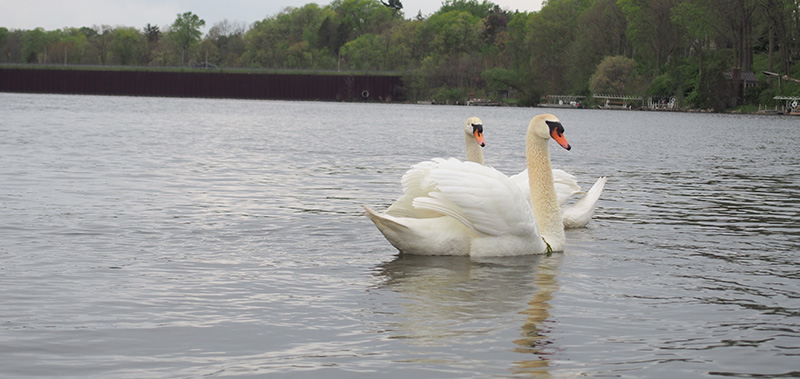
Feeding
People should not feed mute swans. Any feeding of wildlife makes the animals feel safe and encourages them, and the impacts they cause, to remain in the area. If a bird feeder is available for songbirds and mute swans are in the area, then the area below the feeder will likely also attract swans. To discourage mute swans, consider taking the feeder down for two to three weeks to encourage mute swans to disperse. Signs can be installed where mute swans are present to communicate that feeding of mute swans is not allowed. Signs are most successful if they describe the negative effects of feeding mute swans and rules against feeding are enforced.
Abatement
Abatement techniques are non-lethal methods used to frighten and discourage mute swans from an area. These techniques will generally send mute swans to other places where they will continue to reproduce and have destructive impacts. Different management methods can entail audial, visual, and physical techniques as long as local ordinances are followed.
Abatement techniques will only be as effective as the amount of effort employed. Abatement must be used repetitively as soon as mute swans appear in the area because mute swans are much more difficult to frighten after they feel comfortable in a location. Also, the effectiveness of abatement greatly decreases if mute swans are fed by people in the area.
The following techniques may be used to disperse mute swans, where safe and legal to do so. Check local ordinances and laws before using techniques. No permits are required to use the following techniques.
Permits
Abatement techniques are not a form of mute swan population control but rather send the problem to another area. If abatement techniques are not effective, other options are available for managing mute swan populations.
DNR will issue free permits to lake or homeowner associations to legally take mute swans, render eggs incapable of hatching, or destroy nests on public lakes. Resident landowners and tenants do not need a permit from the DNR to take mute swans that are causing damage or posing a health or safety threat to people or domestic animals on land or private water that they own or lease, following local ordinances. A permit is also not necessary to disperse the swans, provided they are not harmed.
